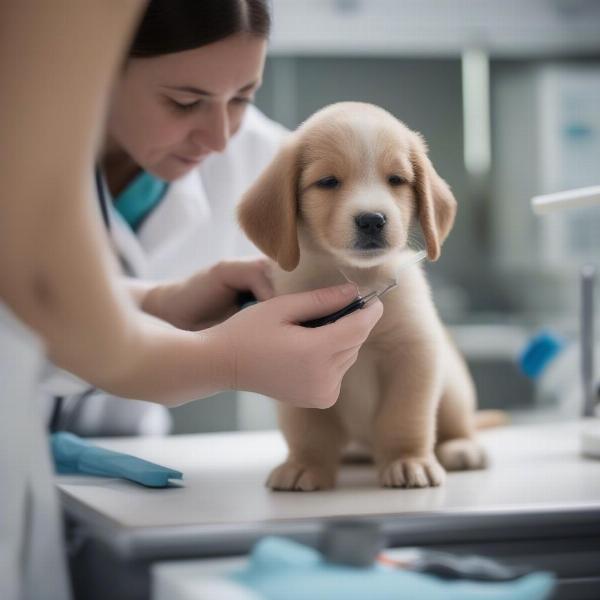Roundworms in dogs are a common intestinal parasite, affecting pups and adult dogs alike. These nasty little creatures, scientifically known as Toxocara canis and Toxascaris leonina, can cause a range of health problems, from mild discomfort to serious illness. Understanding how dogs get roundworms, the symptoms, and the available treatments is crucial for every responsible dog owner.
Understanding Roundworm Infections in Dogs
Dogs can contract roundworms in several ways. Puppies can be infected before birth through the placenta or after birth through their mother’s milk. Adult dogs can ingest infective eggs from contaminated soil, feces, or by consuming infected prey like rodents. Once inside the dog, the larvae migrate through various organs, including the lungs and intestines, before maturing into adult worms.
Recognizing the Symptoms of Roundworms
While some dogs may show no symptoms, others can exhibit a variety of signs, depending on the severity of the infection. Common symptoms include a pot-bellied appearance, especially in puppies, vomiting (sometimes with worms present), diarrhea, weight loss, dull coat, and coughing. In severe cases, roundworm infections can lead to intestinal blockage or even pneumonia.
Diagnosing and Treating Roundworms
If you suspect your dog has roundworms, a trip to the veterinarian is essential. Your vet will perform a fecal examination to check for the presence of roundworm eggs. Fortunately, treatment is relatively straightforward. Several effective deworming medications are available, typically administered orally. Your vet will determine the appropriate dosage and treatment schedule based on your dog’s age, weight, and the severity of the infection.
Preventing Roundworm Infections
Prevention is always better than cure. Regular deworming is crucial, especially for puppies and dogs who spend a lot of time outdoors. Maintaining good hygiene, such as promptly cleaning up dog feces, can help minimize the risk of infection. Additionally, preventing your dog from hunting or scavenging can also reduce the chances of ingesting infected prey. Talk to your vet about the best deworming schedule for your dog, especially if you’re considering breeding.
The Importance of Regular Deworming
“Regular deworming is a cornerstone of preventative pet care,” says Dr. Emily Carter, DVM, “Not only does it protect your dog from the discomfort and potential health risks associated with roundworms, but it also helps to prevent the spread of these parasites to other animals and even humans.”
 Veterinarian Examining Puppy
Veterinarian Examining Puppy
Conclusion
Roundworms are a common but treatable parasite in dogs. By understanding how dogs contract roundworms, recognizing the symptoms, and implementing preventative measures, you can help keep your furry friend healthy and happy. Regular veterinary checkups and deworming are crucial for early detection and effective treatment. Don’t hesitate to contact your veterinarian if you have any concerns about your dog’s health.
FAQ
- How often should I deworm my dog? Puppies should be dewormed every 2-3 weeks until they are 12 weeks old, then monthly until they are 6 months old. Adult dogs should be dewormed at least every 3 months, or more frequently if recommended by your vet.
- Can humans get roundworms from dogs? Yes, while rare, humans, especially children, can contract roundworms from dog feces. Practicing good hygiene, such as washing hands after handling dog waste, is essential.
- What are the signs of roundworms in puppies? Puppies with roundworms may have a pot-bellied appearance, vomiting, diarrhea, poor growth, and a dull coat.
- Are there any natural remedies for roundworms in dogs? While some natural remedies are touted, it’s crucial to consult with your veterinarian before trying any alternative treatments. Conventional deworming medications are generally safe and effective.
- Can roundworms cause serious health problems in dogs? Yes, in severe cases, roundworms can lead to intestinal blockage, pneumonia, and even death, particularly in puppies.
- How can I prevent my dog from getting roundworms? Regular deworming, proper hygiene, and preventing your dog from scavenging or hunting can help minimize the risk of infection.
- What should I do if I think my dog has roundworms? Contact your veterinarian immediately for diagnosis and treatment.
Related Articles
- best wormer and flea treatment for dogs
- dewormer for dogs panacur
- frontline wormer for dogs
- best worming tablet for dogs
ILM Dog is your trusted resource for expert advice on dog breeds, health, training, nutrition, grooming, and much more. We offer comprehensive guides and practical tips for dog owners of all experience levels. Whether you’re a seasoned dog parent or just starting your journey, ILM Dog provides valuable insights to help you provide the best possible care for your canine companion. Contact us today for personalized advice! Email: [email protected], Phone: +44 20-3965-8624. Visit ILM Dog for more information on dog care and everything dog-related.